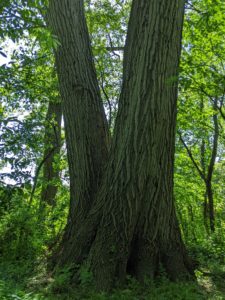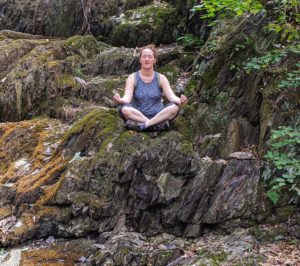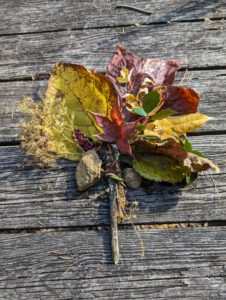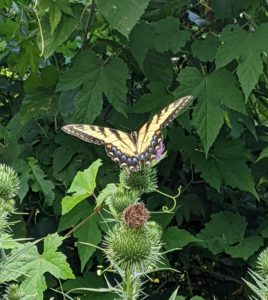Eco-Mindfulness
We should be able to be our true self. That means we should be able to be the river, we should be able to be the forest…
Thich Nhat Hanh, Being Peace, 1987
What is Eco-Mindfulness?
Eco-Mindfulness, or Mindfulness in Nature, is a concept formulated from a combination of philosophies and practices that help participants discover both their inner wisdom and the wisdom from Nature herself, and together provide a guide for how to foster equanimity (or balance) between our own needs and those of the earth, so that we may find ways of healing both ourselves and the ecosystems we inhabit.
The symbol for the Mindfulness in Nature class series is the double-trunked tree. One trunk represents the wisdom we get from Nature and the other trunk represents our inner wisdom. There is an invisible third trunk as well, which is the collective wisdom we learn from each other when we practice together. The roots of this tree are Mindfulness as they anchor us to a strong foundation and continue to grow deeper as we practice. The branches and leaves are the personal and collective growth that develops out of our shared wisdom.

——
What are Eco-Mindfulness practices?
Eco-Mindfulness involves a weaving together of concepts from Buddhist Mindfulness practices, Indigenous wisdom, Ecology, Forest Therapy, and Ecopsychology, as well as wisdom from Nature herself. The classes highlight some of the main components of the Mindfulness-Based Stress Reduction (MBSR) course, including sitting and walking meditation, breathing techniques for stress reduction, turning toward difficult emotions and physical pain, self-compassion and compassion for others, as well as mindful listening and gratitude practices. The MBSR course was created by Jon Kabat-Zinn at the Center for Mindfulness at UMass Memorial Medical Center in Worcester, Massachusetts. Many scientific research studies have been done in recent years showing the benefits of MBSR practices for those struggling with anxiety, depression, and stress, as well as physical ailments including chronic pain, fibromyalgia, digestive disorders, migraine headaches, etc. While Eco-Mindfulness classes include guided meditations similar to those in the MBSR course, a unique difference is the incorporation of both nature imagery and practices that ground us in the support of the earth and connect us with seasonal changes.

In addition, Eco-Mindfulness infuses elements of nature meditation and activities designed to enhance the use of our senses and awareness of our surroundings. The combination of Mindfulness practices and learning to be in Nature complement each other in many ways, helping participants learn to accept whatever they are experiencing in the present moment, and access both their inner wisdom and the wisdom Mother Nature provides when we are able to listen. The classes also incorporate teachings from Indigenous cultures, such as practices of gratitude and respect for all beings. When we recognize the innumerable gifts that Nature provides, this results in Reciprocity leading us to respond by protecting and restoring the natural ecosystems with which we are intimately connected.
Learn More About These Practices

Why do we need Eco-Mindfulness?
The People are coming home to the land. We are learning to listen again. But for many years now, we have lost our connection with the land, and with it, our Souls and our Spirit. A period of regrowth after destruction is possible – if we learn from our mistakes. But will we learn from our mistakes?
I visited Yellowstone National Park about 7 years after the devastating forest fires of 1988, and as far as I could see, emerging from the destruction, were 3-4 feet high conifer trees, blanketing every hospitable hillside. In many places, the forest is regenerating. Can we help Native species return? Can we help them come home too? The land knows how to regenerate itself. So do we, if we take time to listen to ourselves and to the wisdom of Nature. There is infinite wisdom within our own bodies, knowledge within our genes and cells, that has collected from millenia of survival as we became more and more complex beings. Nature also has collective infinite wisdom that many Indigenous cultures understood much better than us. The relationship with Nature can and must be reciprocal if we are to survive as a species. Will we learn to live with the land again? As we heal the land, can we also learn to heal ourselves?
The Climate Crisis and Mental Health Crisis: An Intimate Connection
Scientists and environmentalists, like myself, have been shouting for decades about the changing climate, collecting the data and then trying to educate anyone who would listen. Now the manifestation is in plain sight for all of us to see and experience for ourselves. The questions remain – why has this education not been enough? Why haven’t we been able to change our behavior, even after we see its problematic effects? Are we so addicted to our fast-paced, materialistic, petroleum-based economy – our cars and our plastics – that we are willing to wipe our species right off the planet? Thus far, the answer is an emphatic YES. Even the shift to renewable energy, which is happening slower than we need it to be, has not taught us about living more simply, finding a happier, deeper, more meaningful existence with less. Instead, we are trying to maintain our energy-consuming lifestyle by just replacing the source. Is this transition necessary for our current culture? YES, because we seem incapable of doing the deep reflective work to realize that there is a much deeper problem occurring. But the wind turbines and the solar panels have their own problems that future generations will be faced with. We are not really planning for seven generations into the future, as the Native American tradition teaches us, are we?
I would like to suggest that the real problem is our failure to recognize that materialism does not fill the holes of our Souls and our Spirits. We all have holes that result from deficits from our childhood, hurts and pains that we are unable to fully process as children. Most of us spend our adult lives dealing with these hurts and pains – often in unhealthy ways. We try to fill our holes with material items, superficial connections, food, etc, and we try to suppress the hurts and pains with substance abuse, medications, running from ourselves, and on and on. Let me say it here plainly – The mental health crisis is real. The phentinyl crisis is real. The obesity crisis is real. We have done a terrible job as a society helping people learn healthy ways to deal with their hurts and pains, and their traumas. I know because I was one of them. Because I was a child of trauma, I have lived my whole life experiencing how our society teaches us to deal with our traumas. It nearly killed me. I see everyone around me struggling with their own hurts and pains, in both healthy and unhealthy ways, but we are all struggling. Some of us with more support than others.
I am one of the lucky ones who had the emotional and financial support to find my way out of the nightmare our culture got me into. It took a crisis for me to realize there must be another way. And what I have found is that there is. I am not the first one to discover it. Fortunately, there were many cultures before ours that were significantly wiser than us, and left us clues, sometimes even instructions. The Elders of some of these traditions are still alive in many cases to teach us. Nature itself also offers clues, hidden gems about how to live well on this earth. But can we learn to listen? Are we willing to listen? And to change?
Learning to live with the land and with each other. To find meaning and connection well beyond our superficial interactions. We must learn healthy ways of filling our holes in order to re-discover this meaning and connection. By healthy, I mean sustainable for ourselves and for the land, water, and air with which we are intimately connected. This learning to live with the earth, each other, and ourselves – to find deeper meaning and connection – this is Eco-Mindfulness. We are capable of so much more. If we can slow down enough to observe, listen, and reflect, we will be able to meet the potential each of us possesses. To rediscover the beauty and love at our core that is interconnected with the beauty and love of every other being on this planet. It is all there for us, if we can learn to tap into it. To fill our holes in ways that give us a deeper fulfilment. Are you ready for the journey?
